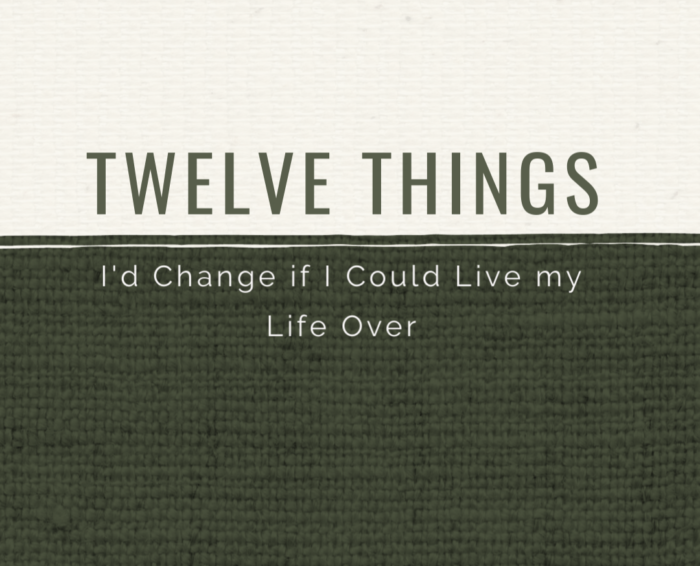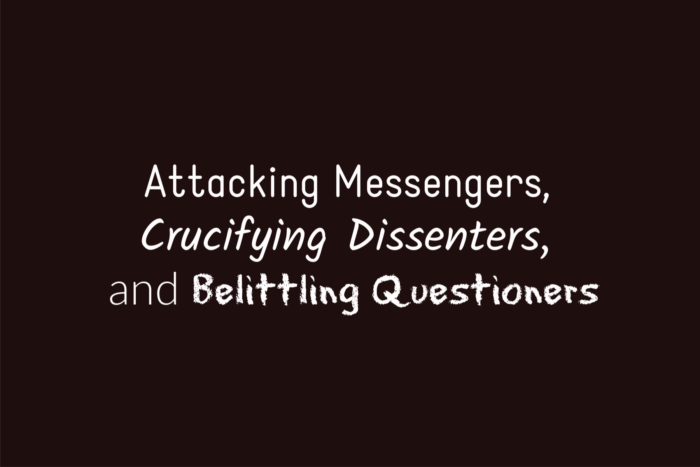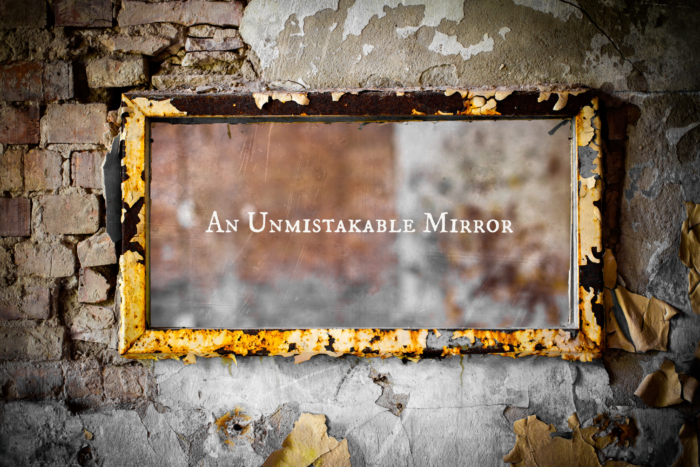
Oftentimes, we evaluate our lives as we approach the end of the year. We examine our life in regards to health, career, education. We consider our bank accounts and we reflect on our relationships. We ask: What could we do better next year?
The most important questions we can ever ask ourselves as we evaluate our past year are: Do I look more like Christ? and Did I learn any spiritual lessons? After all, these are the only things of lasting and eternal value.
Education, good jobs, making money, and beautiful homes are nice, but they aren’t the heart of a Christian’s life. Popularity, fame, and 100,000 Instagram or Facebook followers may be very gratifying but it’s not what really matters in life.
So now is a good time to ask: What are my top priorities for the new year?
As you consider this, I compiled a list of a few things that I’d love to go back and change if I could live my life over. Some are major and some are not-so-major. Other than the first two (which I consider, by far, the most important), they are not in any particular order. As I evaluate my life, these are the things I’d love to do differently. This list is not exhaustive and I know that there are some that are just not coming to mind right now.
If we have a priority to walk with God and to teach our families to walk with God in the upcoming year, then I hope this list encourages you and gives you some practical ideas of how to get started–
1. Be more faithful in reading and studying Bible; memorize passages. God’s Word is transforming. We need the Bible in order to know and love God. It is our guidebook, showing us how to live. It is our mirror, convicting us of sin. And yet, I hindered my walk for years by being satisfied with shallow devotionals instead of actually reading the Bible. And yes! Memorize! I just started this last year and I can’t even begin to tell you the difference this has made in my walk with the Lord. Oh, why didn’t I do this earlier….??
2. Be much more diligent to have my kids learn and study and memorize God’s Word. God’s Word was always the authority in our home, but, oh, how I wish I would have been so much more faithful in having my kids in the Word and memorizing it in a much more systematic way. This is the only thing that will carry them through the trials that come to us all and the only way they can stand under the persecution they can expect to receive as Christians.
3. Put my distractions aside and play more with my kids. The laundry, the dishes, the household work, the phone call, the tv show–they could have waited. Not that I never played with them. But, looking back now, I realize now just how fast the time goes and I wish I would have spent even more time with them.
I am so very glad I didn’t have the temptation of looking at my phone when I had kids. I feel rather bad for those of you who have smartphones and tablets at your fingertips, tempting you to check on them and then pulling you in at all moments of the day. I encourage you to put them in a room far away and focus on your kids! Trust me, you will regret it if you don’t.
4. Be more diligent to keep an eternal perspective in all things but especially when it pertained to raising my kids When we are in the midst of parenting, we are often concerned about two things–will my kid still like me if I do or don’t allow this? And will their friends still like them if we don’t allow this? But neither of those matter. It’s so much more important that our children love and serve the Lord than that they fit in with the in-crowd–this one fact changes so many decisions we make as parents! Sure, they may be mad at us or even scream at us, but standing firm pays off in the long run. For the most part we stood firm on God’s Word in our family and we were often ostracized because of it, but as I reflect on our parenting years, I do regret some of the decisions we made based on peer pressure. (Let me add here, that there is also the opposite–where we make far too many {unnecessary} rules that have nothing to do with scripture. Please don’t do that. It breeds rebellion. If you have a rule, make sure it has a scriptural principle behind it and that your kids know what that principle is.)
5. Be much more careful in what I set before my eyes and listen to with my ears; I was always fairly careful, but even things I would have considered “innocent” I can see now were promoting infidelity or bad language or lying. They were full of human wisdom or showing an ungodly model of a family (just how many sitcoms can make Dad look like a complete idiot?!?). I would work harder earlier in my life to eliminate all forms of entertainment that do not glorify God. I know some of you may think I am “over the top” but entertainment changes us. We are fooled into thinking it doesn’t matter but it most certainly does. I still have so far to go in this area, but I do feel like a different person since I have eliminated quite a bit of what is worldly entertainment from my life. But that’s a topic for another day…
6. Be kinder to my husband; I think I am especially cognizant of this because of losing my sister-in-law this past year. I’m sure my brother would only love to have her there, irritating him in whatever way she may have done so. It is always hardest to be kind and loving with the ones that we live with. I really want to be more intentional in nurturing my marriage this coming year.
7. Have far more grace for others; I didn’t have a lot of grace for others as a young person. I am so very thankful that God has brought situations and people into my life that have wrought a great change in this area. But I sure do wish I would have recognized way earlier in life that “but for the grace of God, go I”.
8. Let the minor offenses go; This is another change God has made in my life due to people and situations. I had to intentionally forgive and choose not to hold a grudge–many times without the other person even knowing that they hurt me. Eventually it became natural (at least much of the time), but it took me too long. Life is so much more enjoyable if we stop being so easily offended.
9. Speak the truth of God’s Word with lots of love and kindness. I never had too much trouble speaking the truth, but the love and kindness part would sometimes take a backseat. I hope that I have made progress in this, although I am sure I sometimes still fail. Those of us who passionately love and defend the truth can often struggle with the love side of things. Would I have done more for God’s Kingdom if I would have changed my tone or said things differently as a younger person? Only God knows. In this, I am so very thankful for God’s forgiveness and mercy.
10. Think of others more often. I was SO selfish as a young person. Looking back, I am dismayed and distraught seeing it. I still can tend to be that way and I have to literally fight against my flesh and do what is right. Sometimes I win that battle and sometimes I don’t. But I truly want to be a blessing by thoughtful words and kind deeds–rather than a burden through sarcasm, human opinions about things that are not scriptural, and selfish acts. This is certainly an area in progress and I sure do wish I was much further along in this one!
Along with this, I wish I would have shared the Gospel so much more freely, without worrying what people think! I am so self-centered that I am {still} often more concerned with what people think about me than I am with someone’s eternal destiny!
11. Recognize that my parents are people who have feelings and need support. I am so dismayed when I consider how selfish I was as a teen and twenty-something. When I was getting married, my grandma was in the hospital. And then she passed away two weeks before I had my first child. I was so wrapped up in my life that I was not there for my mom. Oh, how I regret this! If you are blessed to have parents, realize now that they are people, too. That their life is not solely comprised of you and your world. Oh, how I wish I would have understood this sooner.
12. Waste far less time worrying about what “could happen”. Worry and anxiety are a prison. They destroy the present and do nothing to change the future. And yet, how many of us find ourselves in that prison, held tightly by their chains? This is a battle in many of our lives but we must fight it instead of cave into it. We are, in essence, saying we do not trust in God. And therein lies the issue. Oh, how I wish I would have wasted far less time in this useless and faith-sapping activity.
___________________________________
So there’s the list. Not that I have arrived. Some of these continue to be quite the challenge for me. One of them I thought I conquered and then, years later, it came back with a vengeance (#12, if you want to know!)
Most, if not all, of these things are changed by intentional choices with the guidance and help of the Holy Spirit. I’ve been giving a great deal of thought to this over the course of the past few months.
Some of the things above have changed over the course of my lifetime, simply from growing in Christ. It has sometimes been two steps forward and one step back, but, gradually, over time, they got so much better. Not perfect but better. But even these things came from changing a small habit or behavior. Making a conscientious choice to sit down with God’s Word in the morning or to mentally turn away from the negative thoughts when someone says something hurtful or to choose to offer grace when someone does something I just can’t understand. Although sometimes still a challenge, it is far more natural now to respond correctly. But it wasn’t always the case. I had to intentionally make a choice.
It is hard to improve anything without intentionally choosing to do so. Before you think I am all caught up in man’s wisdom and the “I can do anything I set my mind to”, I want to stop right here.
I am not saying that lasting change can be had without the Holy Spirit. What I am saying is that becoming more Christ-like isn’t just going to happen one day without any work from us at all.
Galatians 5:24-25 says this:
And those who are Christ’s have crucified the flesh with its passions and desires. 25 If we live in the Spirit, let us also walk in the Spirit.
We have to crucify our flesh. It’s an action on our part. In this verse and earlier in that chapter we can also see that we are to walk in the Spirit (v. 16) Again, it’s intentional action on our part.
Life is like a quickly fading flower. Those of you who are young will blink and find yourselves where I am. You, too, will look back over your life and wonder how in the world you ever got here so incredibly fast. Live intentionally now so that your “things I’d change” list is shorter than mine!
(For those of you who have lived as long or longer than I have–what would you change? Your comments on this may help a younger reader. We are all different and have different struggles, so I’d love for you to share your thoughts on this.)










